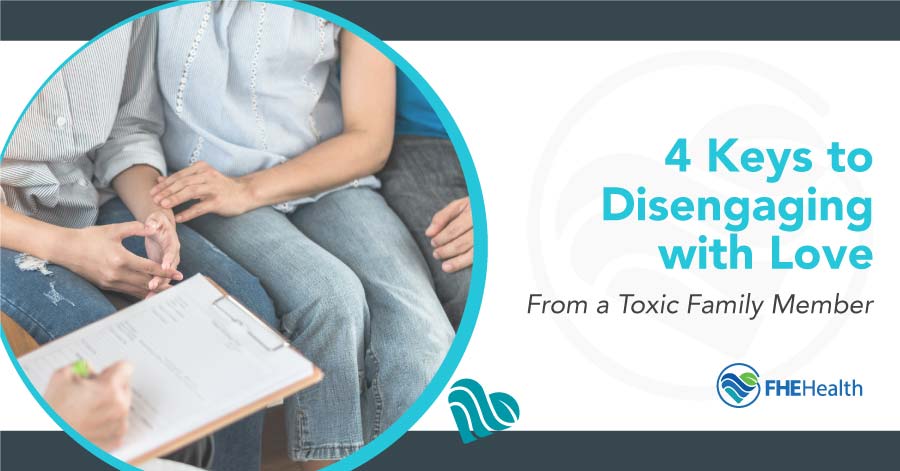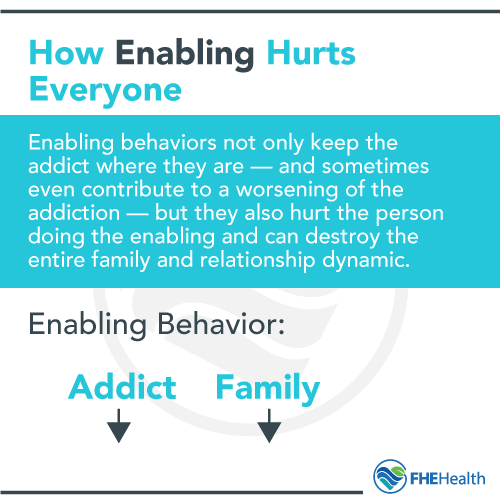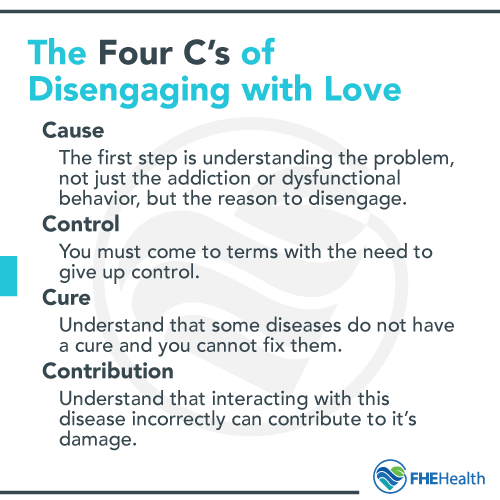
It’s hard to watch someone you love struggle with life, whether that’s because of a substance abuse disorder or some other mental health issue. While supporting your loved one during this time can be very helpful, there’s a fine line between support and enabling, and the latter can cause just as much damage as the addiction. Understanding more about enabling and how to detach with love can help you protect yourself from the ramifications of another person’s addiction and increase their chances of successful recovery.
Why Disengaging Is Sometimes Necessary
 Giving a friend or family member who has an addiction or substance abuse problem money or a place to stay may feel like supporting them. You might think you’re helping them stay safe, for example. But enabling an addict can actually make their problems worse and create new ones for you.
Giving a friend or family member who has an addiction or substance abuse problem money or a place to stay may feel like supporting them. You might think you’re helping them stay safe, for example. But enabling an addict can actually make their problems worse and create new ones for you.
Enabling is when your actions and behaviors make it easier for the addict to continue to engage in their addiction. Examples of enabling behaviors include:
- Supplying the addict with a home, car and/or money
- Lying about or defending the addict’s behavior to others
- Bailing them out of jail or paying for lawyers and other legal expenses
- Arguing, begging or bargaining with the addict
- Rescuing them from the consequences of their actions
Enabling behaviors not only keep the addict where they are — and sometimes even contribute to a worsening of the addiction — but they also hurt the person doing the enabling and can destroy the entire family and relationship dynamic. It can cause major financial consequences and lead to feelings of worthlessness, depression, and anxiety when the enabler is not able to “fix” the other person, no matter how hard they try.
It’s important to understand that enabling behaviors usually come from a place of codependency and fear of losing the person — either the person leaving or even dying. Many people don’t even realize they are enabling and therefore hampering their loved one’s chances of recovery. However, recognizing enabling for what it is and learning how to step back is key to protecting yourself, the other person and your future relationship.
Disengaging With Love
 Maybe you’ve taken an honest look at your situation and how your fears and insecurities have transformed into enabling behaviors that aren’t helping anyone, but you’re not sure what to actually do about it. This is normal. Stopping enabling and codependency is a recovery in and of itself, but the right tools can make a big difference. Once you’ve come to the conclusion that detaching with love is the right move, keep in mind the 4 C’s.
Maybe you’ve taken an honest look at your situation and how your fears and insecurities have transformed into enabling behaviors that aren’t helping anyone, but you’re not sure what to actually do about it. This is normal. Stopping enabling and codependency is a recovery in and of itself, but the right tools can make a big difference. Once you’ve come to the conclusion that detaching with love is the right move, keep in mind the 4 C’s.
1. Cause
Before you can take any steps forward, you must understand where the substance abuse problems come from. It’s very easy for people who are codependent to assign a false level of blame to themselves, but just like with any other disease — think diabetes or cancer — no one has the power to cause another person to become addicted. Addicts commonly blame everyone around them for their problem (because it’s easier to blame others than to take responsibility for their actions), but this doesn’t make it true.
2. Control
Those who tend to enable also tend to want control over people and the situation. This comes from a belief that having control over the situation can prevent anything bad from happening. However, this is a false belief. No one can control anyone else, and trying to do so actually stifles the relationship and the other person’s growth. In Al-Anon, Step 1 is to give up control, and this applies to enabling as well. Focusing only on the things you can control (your own behaviors and how you respond to people) can help keep this in perspective.
3. Cure
Substance abuse and addiction is a disease, but unfortunately, it’s a disease without a cure. Proper diagnosis and treatment can lead to a full recovery, but once someone is an addict, they will be an addict forever. It’s important to realize this so you have a thorough understanding of how addiction (including relapse) works. It also means that if you’re someone who has a codependent personality and tends to engage in enabling behavior, you will likely always have this tendency. This doesn’t mean you’re doomed to keep repeating the same cycles, though. Just like someone with a substance abuse problem, you need to focus on your recovery and stay watchful for signs of your own relapse.
4. Contribution
To recover from enabling behaviors, you have to fully recognize that those behaviors are contributing to the progression of your loved one’s addiction. Realizing the full weight of this can provide the impetus you need to focus on your own recovery and to learn different patterns of behavior that don’t contribute to addiction or relapse. Once you understand how your behaviors play into the cycle of addiction, you can focus on changing your role to be part of the solution instead of part of the problem.
When you’re learning how to detach with love from a friend or family member struggling with addiction or substance abuse, it’s very important to have support for yourself. Talking with a mental health professional about the situation and your struggles can help you get some outside perspective on what’s going on and how you can protect your own mental health during this time.
The Importance of Follow Through
You already know that recovering from a substance abuse problem is hard. But codependency and enabling are also addictions of sorts, and it’s crucial to understand that your own recovery probably won’t be a fast or linear process. The most important things you can do are committing to the process, anticipating escalation of behavior, holding to your boundaries and practicing self-care as you navigate this time.
If someone you love is currently dealing with a substance abuse or addiction problem and you’re not sure what to do, FHE Health can help. We offer family support programs that focus on codependency, enabling and how you can help support the health of your loved one and yourself.






